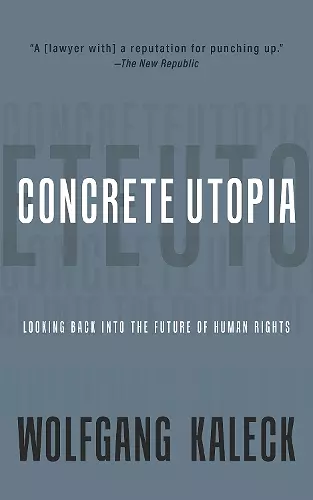The Concrete Utopia
Looking Backward into the Future of Human Rights
Format:Paperback
Publisher:OR Books
Published:4th Apr '24
Should be back in stock very soon

- Leveraging connections made as founder of the European Center for Constitutional and Human Rights. In Germany, pitch op-eds, excerpts, and reviews.
- The author has an extensive history as a human rights activist and lawyer, most notably, working as Edward Snowden’s lawyer. This prominence will be used to further promote the book.
- Pitch television, radio, and podcast interviews to Democracy Now!, The Young Turks Show, Useful Idiots, NPR Politics podcast, Stuff You Should Know, Radiolab, The Ezra Klein Show, and more.
- Pitch op-eds, excerpts, and reviews to The Progress, Guernica, The New York Observer, Against the Current, New Left Project, Peace News, LA Progressive, New York Review of Books, Morning Star, CounterPunch, The Nation, The Guardian, The New York Times, Los Angeles Review of Books, The Chicago Tribune.
Concrete Utopia conceptualizes the human rights project of the last two and a half centuries as a “backward-looking” endeavor, which, in order to move forward, must return to the utopian roots of its foundational documents.
Human rights advance by judging the ills of the present world from a standpoint in the future where they might no longer exist—a fundamentally utopian gesture. This peculiar character of human rights makes them continually ripe for reinvention and for responding to changing world circumstances. Looking at topics such as the Auschwitz trials in Frankfurt in the mid-1960s, public outrage to the Vietnam War, the US civil rights movement and the founding of Amnesty International in 1961, this book surveys the history of human rights and how they have been reconceived at different points in time. It closes by sketching the way they may be re-envisioned for new struggles in the 21st century.
At a time when the human rights project has endured criticism for being toothless or even for providing a pretext for military invasions, Kaleck argues that the current global crises, from inequality, to ecological collapse and the “age of pandemics,” can be countered by reinventing human rights work through feminist, decolonial and ecological interventions.
“A lawyer with a reputation for punching up.”
—The New Republic
ISBN: 9781682194393
Dimensions: unknown
Weight: unknown
140 pages